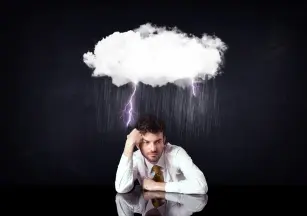
What is life like for people affected by anhedonia? Generally speaking – without the ability to feel joy and pleasure. Admittedly, anhedonia cannot be equated with depression, because anhedonia can occur in people who do not have depressive disorders. However, very often it is a symptom of depression – a disease that, if left untreated, can end tragically. How to cope when nothing makes us happy and the smile remains only a memory?
Anhedonia – when nothing evokes emotion
Anhedonia is a disorder that occurs in people who have lost the ability to feel joy. The author of the term was the French psychologist and philosopher Théodule-Armand Ribot, who a hundred years ago defined the inability to experience satisfaction in this way. Anhedonia concerns a variety of pleasures – both bodily, spiritual and intellectual. Situations and events that were previously a source of pleasant sensations cease to be enjoyable with anhedonia. Anhedonia cannot be equated with depression – yet anhedonia remains one of the key symptoms of depressive disorders. Nevertheless, it should be remembered that it can also occur completely separately or accompany other mental disorders, e.g. addiction syndromes or schizophrenia. Although anhedonia is most often presented as a condition associated with the inability to feel positive sensations, it is worth noting that the concept is much broader. People with such a disorder also do not feel other emotions, e.g. negative ones. Anhedonia in many cases is associated with a lack of spontaneity and translates into interpersonal contacts. More and more often, this disorder is defined as a social problem that can cause serious misunderstandings between the person affected by anhedonia and the environment, especially emotional, spontaneous people. Showing emotional and psychological involvement in dealing with others is a pillar of non-verbal communication.
How to help a person with anhedonia?
Anhedonia is a difficult condition for relatives and friends of a disordered person. It is often associated with misunderstanding, causes irritation and anger. What to do? How to help in such a situation? The first and most important step is a visit to a qualified psychologist and a diagnostic process that determines whether anhedonia is not accompanied by other disorders. It happens that a psychiatric consultation is necessary, especially when depression is suspected. The specialist determines whether the patient has only the blues or the condition is more serious. The examination primarily includes a conversation with the person affected by anhedonia, sometimes also with their relatives. To go to a specialist and take this most important step, you first need to be brave and admit to yourself that the problem exists. Many patients are unable to accept their own weaknesses and do not seek professional help. When you can’t face the problem, all that’s left is a gradual, progressive isolation from the environment. That is why the role of relatives of the disturbed person is so important, who in a gentle and understanding way can convince them to seek specialist advice and, if necessary, to start treatment. It is worth taking advantage of this opportunity – especially since there are a number of antidepressants that can change the lives of both patients and their environment.









